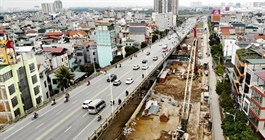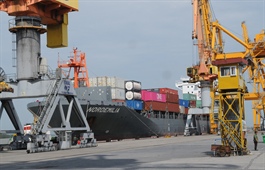Pandemic relentless in damaging economy
Pandemic relentless in damaging economy
The current ongoing Covid-19 pandemic has been relentless in damaging the whole economy, which is getting weaker and weaker as social distancing regulations continue to be implemented for longer and longer periods, and across almost all provinces and cities of the country.
Illustrative photo.
|
These social distancing regulations are in place in most major economic zones, industrial production areas, and centers of supply and value chains. This has caused havoc for all economic activities that have now been severely disrupted. This massive onslaught on core and essential businesses has also caused serious macro uncertainties which are only continuously increasing by the day.
Production disrupted
The capital city Hanoi was quick to implement Directive 16 from the Prime Minister last week, in an all-out effort to contain the spread of the virus in all localities. Earlier, nineteen Southern provinces had already implemented strict social distancing measures to curb the disease. Applying even stricter conditions to contain the virus from spreading, Ho Chi Minh City has applied extremely tight measures than even stated in the contents of Directive 16, as cases of infections have been rising at a phenomenal speed and numbers increasing daily. Up until now, in the last nearly two months, Vietnam's largest economic hub was under temporary restrictions on most of the city’s economic activities, but now it has become imperative to stop the spread of the disease under all costs.
Compared to one year ago, the social distancing regulations this time are very strict and for a longer duration of time. More importantly, since the Delta variant spreads faster and has unknown ways of spreading, there has been a vast increase in the number of infectious cases, to nearly tens of thousands of cases per day in a week. Moreover, this fourth wave of the Covid-19 pandemic has severely caused immense damage to businesses and manufacturing units in both the major economic centers of the country, namely, Ho Chi Minh City and Hanoi. Earlier, the disease had spread like wild fire in Bac Giang and Bac Ninh, the industrial zones responsible for supplying essential intermediary goods to the value chains and production lines for factories throughout the country.
Ho Chi Minh City is staggering the most under the fourth wave of the pandemic, and as a result almost a third of the national budget has taken a direct hit. The country’s main economic hub has slowed drastically, and the present conditions have weakened the economy greatly. If we see public investment, exports and domestic consumption as pillars that support the growth of the economy, the current situation has certainly weakened all these resources substantially.
According to a socio-economic report for the first six months, the Government plan for the second half of the year and the allocation and disbursement of public investment capital is extremely slow. In the first half of the year, only 30% of public investment capital was disbursed as planned, 5% lower than in the same period last year. Similarly, exports have also failed to meet the set targets and the trade balance is moving towards showing a trade deficit.
While many other world markets are recovering strongly, the third quarter growth of the world economy is expected to set a record, showing that export demand is increasing. The current situation shows that Vietnam will find it difficult to meet the demands of domestic production and is facing many difficulties due to limited activities at present as all resources are being mobilized to fight the pandemic. Currently, there are very few businesses that can continue to work under the strict conditions of social distancing rules. This has led to increased costs but low productivity and low economic efficiency, and which will no longer guarantee competitiveness.
Other factors such as domestic consumption and investment of the private sector are also declining sharply due to the spread of the disease, which has created a palpable sense of fear in the entire community. Widespread social distancing is sure to deal a fatal blow to consumption and investment in coming months, and the economic slowdown is quite likely to last throughout the year. More than 60% of GDP of Ho Chi Minh City comes from the services sector, which is now mostly paralyzed because of long and lengthy periods of strict social distancing across most localities.
Under the current scenario, there is also no feasible macro solution to ensure that economic activities are maintained, as most enterprises are relying on the vaccine to bring about a change in the movement of the general population. However, even if this strategy achieves the planned goal by injecting two doses of the vaccine, only 70% of the population will achieve herd immunity by March 2022. Under this estimate, economic prospects are still bleak as the vaccine is not 100% effective. Along with the rate of ineffectiveness, and the number of people who are still to be vaccinated, we see a very large population in waiting. If the infection reoccurs, it will still be as dangerous and will continue to threaten the health system and as a result the economy to will continue to suffer.
This has happened in some countries, despite vaccination rates being very high, and are continuing to deal with situations of re-infections and the possibility of a new outbreak in July, for example in the UK, France and Israel. These countries all have vaccination rates for above 60% of the population. Therefore, only when Covid specific drugs are widely accepted in many countries and mass produced for dissemination of the disease, can the economy return back to a state of normalcy, a situation currently hard to imagine.
Enterprises face fatigue
One of the main reasons that Vietnam achieved remarkable success in 2020 was due to immense fortitude, diversity and flexibility applied by businesses, especially by the private sector. During the last difficult year, it was the accumulated and built up resources over a long period of time that helped businesses overcome the crisis phase, maintain production and business activities, and ensure jobs and an income for employees, while continuing with activities to meet signed contract orders with partners.
However, the ferocity with which the fourth outbreak of the pandemic hit all levels of society has eroded and weakened the resilience of businesses to continue with any innovative means. According to statistics, the number of businesses withdrawing from the market so far has continued to increase, and could be even upto nearly 25%. Businesses temporarily suspending activities increased by more than 22%, and accounted for approximately 51% of the total number of enterprises withdrawing from the market in the first six months of 2021.
Without timely and effective support, the situation will certainly worsen even further. When difficult factors of macro environment combine, they cause negative ripples on the endurance capacity of enterprises. The number of businesses that have to temporarily quarantine their workforce, or permanently stop operations will continue to increase sharply in the next six months, when the pandemic situation becomes even more and more severe as infections continue to spread.
Therefore, all support packages this time must be larger in scale because the health of businesses is not as strong as a year ago, and the number of businesses need much more help now with the pandemic raging on. The support package of VND 26,000 bn as released by the Ministry of Finance, and just been submitted to the Government to meet the set targets, may not be sufficient enough in the current crisis.
Also, the time factor is very important at present because the difficult crisis situation weighing down on enterprises is now much more severe and serious. In addition to preferential lending policies, interest rate reduction, debt rescheduling, late payment of tax, and social insurance obligations, additional solutions are needed to assess the current status of businesses and provide appropriate support policies.
The support should be similar to the medical model of a five-storey pyramid when treating an F0 patient. That is to say, we must see which businesses can manage on their own without help, which businesses need to be prioritized for support, which businesses need to undergo restructuring, and which businesses have to stop operating completely. This overall strategy will require a lot of resources, but if it is not implemented and businesses are left to fend for themselves, I am afraid that the cost will be dire and huge.
Macro uncertainties
When macro factors worsen in operations, the resilience of enterprises comes under strain and possibly even totally exhausted, which then causes bad debt ratio in banks to increase further. The fact that the difference between deposit and lending rates of commercial banks is being maintained at a very large level currently is a manifestation of the credit risk premium, which is a way in which the banking system manages to move the risk of a difficult economy onto interest rates.
The recently released Macroeconomic Report for the second quarter by the Institute for Economic and Policy Research (VEPR), also expressed concerns about inflationary pressures that will weigh on the economy in the last six months. Now world commodity and raw material prices are increasing sharply. As of June, the price of non-fuel goods, including agricultural raw materials and inputs for industrial production, increased by nearly 40% year-on-year. In this, the price of input materials for industrial production increased by nearly 70% and the price of raw agricultural materials increased by 30%. Fuel prices also increased by 110% mainly due to irregular supply cuts.
When looking at the graph, the CPI line, which reflects inflation expectations, is on a strong upward trend. The average Consumer Price Index (CPI) in the first six months of 2021 increased by 1.47% over the same period last year, the lowest increase since 2016, but signaling that aggregate demand was shrinking.
Meanwhile, the PMI, which reflects a sharp decrease in the number of purchasing orders of the manufacturing sector, stopped at 44 points in June, showing that business and production activities are fast shrinking. The contraction of aggregate supply and aggregate demand, accompanied by increased macroeconomic uncertainties, will make the real economic sector become weaker. All of this will be transmitted to the financial banking sector, and vulnerability will then become even more volatile.
The recent stock market movements have shown more instability when prices rose and fell abnormally without any explanation, showing signs of speculation and price manipulation. After surpassing 1,400 points and setting a new peak of 1,420.27 points on 2 July, the stock market began to plunge, and so far it has dropped more than 149 points. Prices go up and down for no apparent reason, but if you think that the sharp decline in prices in the last few days was due to the impact of the Covid-19 pandemic, then we need to ask the question whether the stock price increased sharply from mid-June to early July when the pandemic began to have negative effect.
The question is whether the strong growth of the stock market will add capital to businesses, or just indulge in buying and selling, and making securities a minor commodity that passes from one person to another, and each time pushes macro instability to increase accordingly.
At this time, there is an urgent need to move immediate focus and energize businesses and production, in an all out effort to strengthen the economy, maximize smoother operations of all economic activities, and maintain economic growth engines although they are slowing down. There is a strong need to minimize macro-economic instability and strengthen risk management for the financial system which covers both banking and the securities sectors.
These are policies that need to be prioritized on an urgent basis because they are much more practical to apply, than pursuing very nominal GDP growth targets.
























